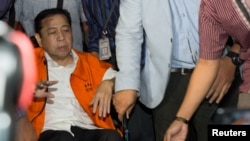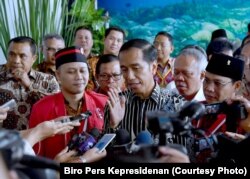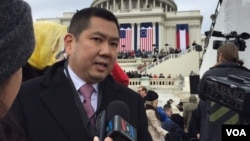Indonesia's ongoing effort to arrest the Speaker of the House, Setya Novanto, for corruption has been playing out in headlines with melodramatic turns, from a hospital stay to a car crash to a house raid.
But beyond serving as a test for Indonesia's anti-corruption efforts, an additional consequence is the fractures the scandal threatens to expose within the Golkar Party, the country's longest-lasting party and one of its major political forces.
It was the ruling party for 26 years during and immediately after the Suharto dictatorship. Novanto was anointed the party's chairman in 2015, but was relieved of his duties Tuesday because of the corruption case against him.
Novanto has reportedly threatened to name names of other politicians within Golkar involved in the ID Card scandal. He is in the custody of the Corruption Eradication Commission (KPK), which has until November 30 to begin questioning him before getting embroiled in a pre-trial motion that Novanto has filed as a stalling measure with the South Jakarta District Court. The graft case revolves around attempted extortion from a company that has a government contract to produce electronic identification cards ("e-KTP") within Indonesia.
The new interim leader is the party's secretary general, Idrus Marham.
If Novanto's trial gets under way, the party will try to elect a new chairman. Golkar has been central to current President Joko Widodo's legislative coalition. There are concerns about cementing its leadership soon because of an intense upcoming year of elections: regional elections in June 2018, and then "unprecedented" simultaneous legislative and presidential elections 10 months later.
Suharto holdover
The modern Golkar party (short for Partai Golongan Kary, or Party of the Functional Groups) arose from an anti-Communist trade union organized by the Indonesian military in 1964. After the military's mass killings of suspected Communists and leftists in 1965 and 1966, military general Suharto took over power from the founding president Sukarno, and was officially elected president in 1968.
Suharto was unaffiliated with a party but needed one, at least nominally, for his re-election campaigns. So, he supervised the transformation of the nonprofit coalition into a political party, whose first candidates ran in legislative elections in 1971.
Golkar continued to be the dominant political party in Indonesia for the rest of the Suharto era, until his dictatorship collapsed in 1998. Until 1997, the party's candidates won 62 to74 percent of all legislative seats in every nationwide election.
The party has adapted to the democratic post-1998 era by electing its chairmen and competitively deciding its presidential candidates. But there are many more parties now than the three state-sanctioned parties of the Suharto era. In the 2009 and 2014 elections, Golkar has won less than 15 percent of the legislative seats and its presidential candidates lost in both 2004 and 2009.
In the past, Golkar has been affiliated with the paramilitary youth group called Pemuda Pancasila. Some of the party's current prominent politicians, like representative Bambang Soesatyo, came up through membership in Pemuda Pancasila.
But at present, most of the ties between the actual military and Golkar have faded, said Evan Laksmana, a researcher at the Center for Strategic and International Studies in Jakarta.
"There is no such thing as a military alliance with political parties anymore, since 1999. The Indonesian military has not and for now will not have any formal or organizational ties with political parties of any kind. The TNI [Indonesian National Armed Forces] does not engage in partisan politics in that sense," Laksmana said.
"If Golkar's electoral performance declines, it wouldn't be because of the role of retirees in their ranks," he added. "It would be because of corruption cases and performance of local Golkar party machinery and elected officials, from mayors to governors."
Crowded party landscape
Observers have pointed to leadership disputes within the party as a source of its diminishing power. The Novanto scandal likely does not help.
But modern Indonesia is also home to a large and constantly changing landscape of political parties.
The media mogul and business partner of U.S. President Donald Trump, Hary Tanoe, started his own party called Perindo last year. A former television presenter named Grace Natalie created the Indonesian Solidarity Party, which focuses on women's rights and pluralism, in 2015. One of its talents is a 21-year-old Twitter star and university student named Tsamara Amany.
Golkar's years of domination are likely over. Still, to even remain competitive in upcoming elections, the party has a formidable task to rebuild itself within a crowded political arena.
And whatever happens to his party, Novanto's political future looks bleak.
"If the South Jakarta District Court rejects his defense, it will be the final bell of his political career," said Arbi Sanit, a political scientist at the University of Indonesia. "And if he somehow wins in court, the Golkar Party will have lost many supporters."






